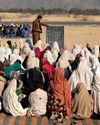
AT THE BEGINNING of September, the discovery that six Israeli hostages had been killed by their Hamas captors as troops operated near the tunnel where they were being held propelled crowds onto the streets of Tel Aviv and other cities.
The focus of the dismay and anger: the government of Benjamin Netanyahu. Israel's main trade union, the Histadrut, called a short-lived but significant strike. Opposition politicians spoke of their dismay at the prime minister's handling of the hostages-for-ceasefire negotiations he has widely been accused of undermining.
Senior military officers and the defence minister, Yoav Gallant, let it be known in private and in public that they preferred a compromise that would prioritise the release of the remaining hostages over Netanyahu's deal-breaking insistence on keeping military control of the Gaza border area with Egypt.
But despite being deeply unpopular outside his own rightwing base, polling at the end of the month for news outlet Maariv revealed that the Likud party of Netanyahu, which many believed could not survive the fallout of Hamas's surprise attack almost a year ago, would win the largest number of seats if elections were called now.
In the aftermath of Israel's killing of Hassan Nasrallah, analysts expected that trend to continue, at least in the short term. A poll for Channel 12 on 29 September-two days after the assassination of the Hezbollah leader - showed another slight improvement in his standing, although at the expense of other parties in his coalition.
Even before Nasrallah's death, Netanyahu's weathering of all storms was surprising, as Israel's war in Gaza drags on, and fighting on fronts from Lebanon to Yemen has sharply escalated.
On the world stage Netanyahu - and Israel by association - has appeared scorned and isolated.
This story is from the {{IssueName}} edition of {{MagazineName}}.
Start your 7-day Magzter GOLD free trial to access thousands of curated premium stories, and 9,000+ magazines and newspapers.
Already a subscriber ? Sign In
This story is from the {{IssueName}} edition of {{MagazineName}}.
Start your 7-day Magzter GOLD free trial to access thousands of curated premium stories, and 9,000+ magazines and newspapers.
Already a subscriber? Sign In

Friendship interrupted
They were best mates. Then one had a baby, while the other struggled to conceive. They share their brutally honest takes on what happens when motherhood affects friendship

KERNELS OF HOPE
During the siege of Leningrad, botanists in charge of an irreplaceable seed collection, the first of its kind, had to protect it from fire, rodents-and hunger

A new horizon' The inverse link between cancer and dementia
Scientists have long been aware of a curious connection between these common and feared diseases. At last, a clearer picture is emerging

Across the universe
Samantha Harvey won the Booker prize with a novel set in space. Yet, she says, Orbital is actually 'a celebration of Earth's beauty with a pang of loss'

Frank Auerbach 1931 -2024
Saved from the Holocaust, this artist captured the devastation of postwar Britain as ifits wounds were his own but he ultimately found salvation in painting

Seven lessons I've learned after 28 years as economics editor
Margaret Thatcher was Britain's prime minister and Neil Kinnock was leader of the Labour party.

Droughtstricken dam leaves economies powerless
A ll is not well with the waters of Lake Kariba, the world's human-made lake largest A punishing drought has drained the huge reservoir close to record lows, raising the prospect that the Kariba Dam, which powers the economies of Zambia and Zimbabwe, may have to shut down for the first time in its 65-year history.

Let this be the end of these excruciating celebrity endorsements
I wish celebrities would learn the art of the French exit. But they can't, which is why Eva Longoria has announced she no longer lives in America. \"I get to escape and go somewhere,\" she explained.

Alive, but unable to thrive under absolute patriarchy
Since the Taliban returned to power, women and girls have tried defiance, but despair at their harshly restricted lives

‘It's tragic’ Reflection in the wake of Amsterdam violence
Carrying signs scrawled with messages urging unity, they laid white roses at the statue of Anne Frank, steps away from the home where her family had hidden from Nazi persecution.